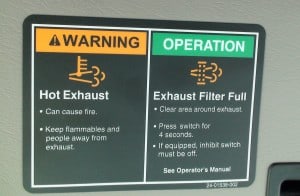
Regen on a diesel truck is a process in which the diesel particulate filter (DPF) burns off accumulated soot to prevent clogging and maintain engine performance. During regen, the DPF is working to clean itself and return to its original state by burning off the built-up soot.
Diesel trucks undergo regeneration to ensure optimal engine function and prevent environmental harm. When the DPF is clogged with soot, regeneration becomes necessary to maintain efficiency. Understanding the regen process helps truck owners manage their fleet effectively and avoid potential engine issues.
By comprehending the significance of regen on diesel trucks, operators can keep their vehicles running smoothly and comply with emission regulations.

Credit: www.pensketruckrental.com
Navigate As You Want:
What Is Regen On A Diesel Truck
Regen on a diesel truck is the process of cleaning the Diesel Particulate Filter (DPF) by burning off accumulated soot. This regeneration is necessary to prevent clogging and ensure the DPF returns to its original state. The purpose of regen is to maintain fuel efficiency and reduce downtime by keeping the DPF clean. During regen, the DPF heats up to burn off the soot, and it can occur as frequently as once a day, especially in stop-and-go driving conditions. If a regen doesn’t occur, the DPF can become too full, leading to engine derating and potential downtime. Excessive exhaust soot triggers the regen process, as it creates back pressure and hinders the DPF’s performance.
How Often Does A Diesel Truck Need To Regen
Regen on a Diesel Truck: Regeneration occurs to clean the DPF from soot buildup, keeping it efficient.
How Often: Frequency of regen varies with driving habits, with some needing it daily.
Factors Affecting: Duty cycle and soot collection determine regen frequency, affecting duration.
Consequences Of Not Regening A Truck
A diesel truck undergoes regeneration to clean the DPF filter by burning off accumulated soot. Failure to regen can lead to engine derating, causing downtime or slow speeds. This not only impacts vehicle performance but also poses environmental concerns.

Credit: www.pensketruckrental.com
Triggers Of Regen
What Triggers Regen on a Diesel Truck? The triggers of regen are excessive exhaust soot, incomplete combustion, and backpressure. When the DPF becomes overwhelmed with excessive exhaust soot from incomplete combustion, it triggers the regeneration process. This soot, a byproduct of partially burned fuel, creates backpressure, further prompting the regeneration cycle. Understanding these triggers can help in managing and addressing regen issues in diesel trucks.
Difference Between Forced Regen And Parked Regen
Regen, short for regeneration, is an important process in diesel trucks that helps clean the Diesel Particulate Filter (DPF) by burning off accumulated soot. There are two types of regen: forced regen and parked regen.
Forced regen is performed when the truck’s DPF reaches a certain level of soot accumulation and needs immediate cleaning. It can be initiated while the truck is still in operation and requires specialized equipment or software.
Parked regen, on the other hand, is performed when the truck is stationary and parked. The purpose is the same – to clean the DPF and prevent clogging. The driver needs to follow certain safety measures, such as parking in a paved area away from gas pumps, applying the parking brake, and starting the regen process.
Both forced regen and parked regen are effective and efficient in maintaining the truck’s performance and reducing downtime. It is important to regularly monitor the DPF’s condition and perform the necessary regen to avoid engine derates and potential damage.

Credit: www.traceyroad.com
Frequently Asked Questions On What Is Regen On A Diesel Truck
What Happens When A Diesel Goes Into Regen?
During a regen, a diesel truck burns off accumulated soot in its DPF to prevent clogging. It’s a self-cleaning process that helps the truck maintain optimal performance and reduces downtime. Regens can happen once a day or more, depending on driving conditions.
Neglecting regen can lead to engine derating and potential damage to the vehicle. Stay safe during regen by keeping flammable materials away.
How Often Does A Diesel Truck Need To Regen?
A diesel truck may need to regen once a day, or more frequently with stop-and-go driving. Active regens can take up to 30 minutes. Failure to regen can lead to engine derating and downtime. Regen occurs due to excessive soot buildup in the DPF.
What Happens If You Don’t Regen A Truck?
Neglecting a truck’s regen can lead to engine derating, potential downtime, and environmental harm due to a full DPF filter.
What Triggers A Regen?
Excessive exhaust soot triggers a regen in a diesel truck to burn off accumulated particles. Incomplete combustion produces soot, causing back pressure and initiating regeneration.
Conclusion
In sum, understanding regen on a diesel truck is crucial for maintaining performance and preventing downtime. This process, essential for cleaning the DPF, helps clear accumulated soot and maintain efficiency. By staying proactive and familiarizing yourself with regen processes and triggers, you can optimize your diesel truck’s performance and minimize potential issues.





